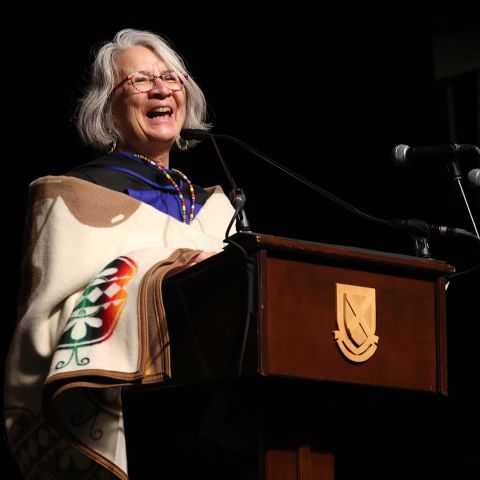
Professor Val Napoleon, the Law Foundation Chair of Indigenous Justice & Governance at the University of Victoria, received an honorary Doctor of Laws degree from Queen’s University on June 21, National Indigenous Peoples Day. At the spring Convocation ceremony held in downtown Kingston, she was recognized for her extraordinary leadership in Indigenous law and legal education. She addressed the newest Queen’s Law graduates with the remarks set out below.
Thank you to all that made this amazing honour possible, especially Lindsay Borrows and Mark Walters, Dean Flood, and so many others here and elsewhere.
Recently while walking about in Victoria, and while thinking about what I might say here today, I chanced across this wise bit of graffiti,
We are not all in the same boat, but we are all in the same storm.
This struck me as being true on so many levels. What might we learn from it? Let’s start by asking three questions:
What comprises the storm?
What comprises the boat? and
Who are the we?
Let’s start with the premise that the we is comprised of every graduate here today along with their dreams and hopes. The we also includes everyone else here today – parents, faculty, staff, and leaders accompanied by their dreams and hopes.
Now let’s turn to the storm. And we hear about the storm everyday through every form of media.
It is a complicated storm that spans the globe, it is multifaceted and includes everything
- from our climate crisis,
- to the undermining of civil society and democracy,
- to vast and increasing economic and political inequities,
- to gendered and sexualized violence for women, gender diverse, and trans peoples,
- to the bewildering welter of false news, unverified facts,
- to endless dichotomies on every issue between the thems and the us’s,
- to the promise and threat of AI, and
- of course, extreme poverty and war.
The we, along with our dreams and hopes, is intimately tied to all the elements in this storm. After all, humans created the storm, and we are in it together.
But let’s not become overwhelmed by this the storm despite the tempting and inviting nature of stories of despair and of doomsday.
Overwhelmed and depressed people are unlikely to make the transformations we so desperately need in our world.
The thing is, for people to make change in this world and with this complicated storm, we need hope. And there is still cause for hope.
None of you would be here today without such hope!
So let’s now turn to the boat.
Drawing on the important scholarship of Ben Ansell, a nation should mean many things, including the
ability to disagree agreeably,
common commitments and collective dreams,
inclusive liberal democracy,
solidarity,
economic sustainability and stability, and
community safety.
We also need trust built by a repertoire of shared memories, stories of how we have settled arguments without violence.
We also need to be able to trust the news or at least fact find to make sure of what we are hearing.
These are all the potential elements of our boat, the planks. A boat that can only be held together by the social glue of hope and solidarity.
The boat must also be built of strong institutions necessary to check power and authority, and to withstand simplistic, polarized answers to complex problems.
An important part of the boat is law, rule of law in its best, inclusive, non-oppressive form.
In our work to rebuild Indigenous law, we ask what makes law law? Who should have a say? What should the work of law be? Is this law committed to the dignity, agency, and human rights of the citizens?
Ultimately these are questions that all Canadians should discuss, and we need to create spaces for such critical conversations to deal with our inevitable but necessary disagreements.
Ansell calls for citizen assemblies, and he argues for their ultimate wisdom in healthy civil societies.
Indeed, these are a part of inclusive democracy.
Solidarity as a people and across difference must be reciprocal.
I treat you seriously as a real person with real dreams and desires, rights and responsibilities, just as I would like to be treated myself.
This is how we create the us, the we, in solidarity across difference.
We can reshape the storm.
We can build a boat to hold us all.
We can be the we that celebrates successes, and protects the less fortunate – those in more fragile or non-existent boats.
Another bit of graffiti:
The world is changed by your example, not your opinion.
So we need experience and action, and this is what can take these into the storm that surrounds and connects to our everyday lives.
In doing so, I encourage you to look for joy in the boat and in the storm.
I encourage you to look for the poetry in each other, and in the we.